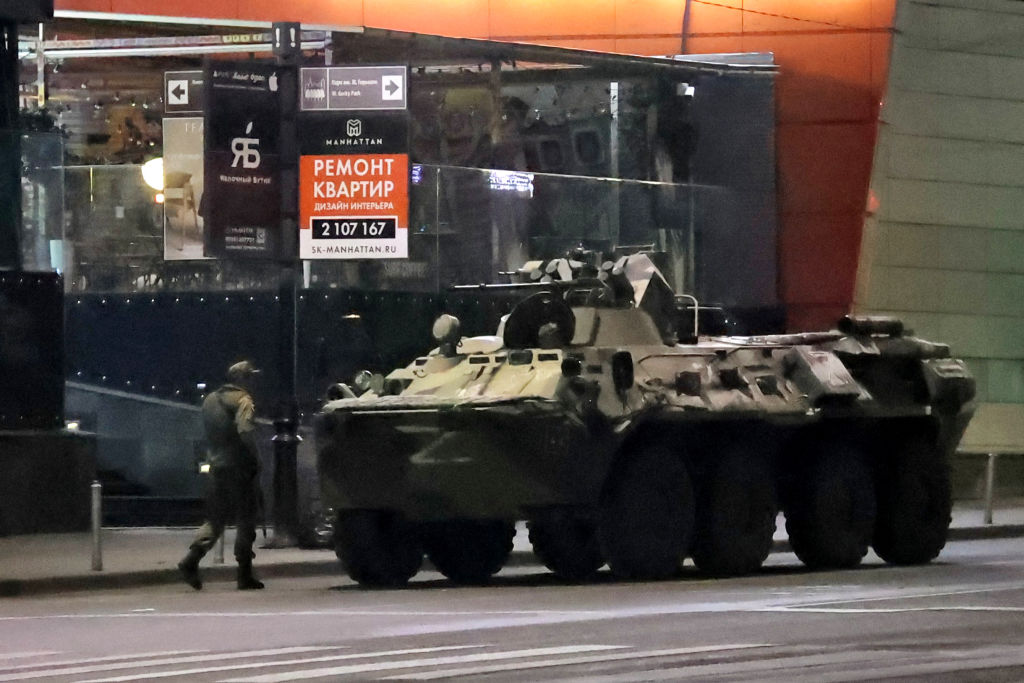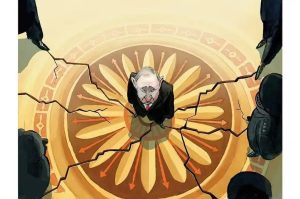On a sunny June Saturday in Rostov-on-Don, southern Russia, the residents would normally be out on the streets. They would be strolling down Pushkin Avenue, stopping to buy ice creams or plastic cups of kvass, the refreshing drink made of fermented bread. They would be walking their dogs, visiting the funfair in Gorky Park or jogging along Naberezhnaya, the promenade running alongside the River Don. Grandparents might be trying to drag the children away from their smartphones and tablets for a visit to the circus.
But this is not a normal Saturday for Rostov-on-Don. Bolshaya Sadovaya, its main thoroughfare, is now crawling with military vehicles and masked soldiers carrying automatics, and the entrance to that circus — which backs onto the Rostov military headquarters — is blocked aggressively by a tank. Rostov-on-Don has been taken by the Wagner Group, Yevgeny Prigozhin’s private army out on the rampage and rebelling against the Russian military high command, calling for Sergei Shoigu, minister of defense, and Valery Gerasimov, chief of general staff of the Russian Armed Forces, to be handed over to them. It is a city now under occupation, and many of its citizens, under “official advice,” are staying home. Telegram channels report that all civilian vehicles have been placed at a standstill, the city governor is arranging food deliveries for those caught in traffic jams, and in Rostov prisons special forces of the penitentiary service have been placed on high alert to prevent any mutiny among the inmates. Rostov-on-Don is not yet a city under martial law but has taken a decisive step towards it.
How has this happened? Following a statement yesterday on Telegram that he and his Wagner Group soldiers had been directly attacked by the Russian Army, raging about the numbers of troops lost through administrative incompetence, Prigozhin effectively declared war on the Russian MoD:
Those who destroyed our guys today, and destroyed tens, many tens of thousands of lives of Russian soldiers, will be punished… Justice in the troops will be restored. And after that, justice for all of Russia.
Late last night, snipers were sighted on the roof of Galeria Astor, one of the city’s foremost shopping centers. The first images of tanks advancing onto the streets of Rostov appeared at 6:30 this morning. Later today, Prigozhin announced that “all military facilities in Rostov are under our control, including the airfields.” He reiterated justifications for the takeover: “Huge territories have been lost. There are three to four times more casualties than are reported to the top, and what is reported is ten times less than what is mentioned on TV.”
Prigozhin, whatever his motives, is clearly a man who gets things done — as the recent horrifying images of Bakhmut, the city he recently razed to rubble, prove. Crossing the border from Ukraine into Russia, Rostov-on-Don was the first major city he and his troops encountered and appears to have fallen to them without a shot being fired.
Late last night, snipers were sighted on the roof of Galeria Astor, one of the city’s foremost shopping centers
The city authorities are not the only ones advising citizens to stay at home. “Anyone who tries to put up this resistance, we will consider a threat and destroy immediately,” warned Prigozhin. “I ask everyone to remain calm, not to succumb to provocations, to stay in their homes… It is advisable not to go out into the streets along the route of our journey.”
Reactions in Rostov are mixed, to say the least: there is panic-buying of gasoline and food and citizens are reported, understandably, as warning any relatives who find themselves outside the city not to come back while the current situation holds. Internet there is said to have slowed to speeds not seen since the 1990s, and there are traffic tailbacks of several miles around the city. Scenes of Rostovites looking stunned on the main thoroughfares come as no surprise, yet there are numerous disconnected images on Telegram suggesting different reactions. One local man wheeling a bicycle is shown intercepting the masked soldiers, asking them what the hell they’re doing there and demanding to speak to their commander. A comment on a Rostov channel simply reads, “Can you please keep the noise down with your tanks? I’m trying to get some sleep.”
“I was so scared last year that today it’s almost OK,” said one stoic friend to me, and others stated their intention to carry on as usual. Bars and cafes are reported as still open — a clip from one of the city’s Vkusno i Tochka restaurants (McDonald’s replacement) shows Wagner Group soldiers pushing themselves to the front for takeaways, other customers naturally quiescent today about the queue-jumping. Meanwhile images of that circus-blocking tank next to posters full of cavorting cartoon elephants bring home the unreality of it all. All public events, needless to say, are cancelled.
Russia is again a country in turmoil easily surpassing the “partial mobilization” of September 21 last year. Its citizens can take little comfort from a speech to the nation rushed out by Putin this morning. Awash with platitudes about “protecting our state and our people from traitors” it offered little in the way of practical measures. Though his comment “I am confident we shall prevail and become even stronger” may provoke bitter laughter in some quarters, the promise that “decisive actions will be taken to normalize the situation in Rostov” can only, in light of the chaos and violence of the last eighteen months, fill the city with dread. Putin has inevitably been blindsided, and past “decisive actions” taken to liberate the hostages in Moscow’s Dubrovka siege of 2002 or the schoolchildren of Beslan in 2004 (not to mention more recent actions in Donbas) have been an appalling debacle, killing as many innocent victims as their assailants.
Meanwhile Rostovites are on tenterhooks to see what the next week will bring. This is day one of the occupation, and it’s set to get a lot worse. Unless they wish to be attacked by the Russian military across the border in Ukraine, the Wagner Group must remain there. Whether or not there are armed clashes on the streets of Rostov, plundering by Prigozhin’s merry band of renegades — convicted murderers, thieves and rapists among them — is liable to begin in a few days’ time. As for events outside the city, one can expect the remainder to continue their march towards Moscow. “Half the army is ours,” Prigozhin has crowed, and very possibly he’s right. Though as a Russian friend remarked grimly, the country’s immediate destiny lies with that other half, whose future sympathies, alignments and fatefully “decisive actions” can only be guessed at.
This article was originally published on The Spectator’s UK website.

























